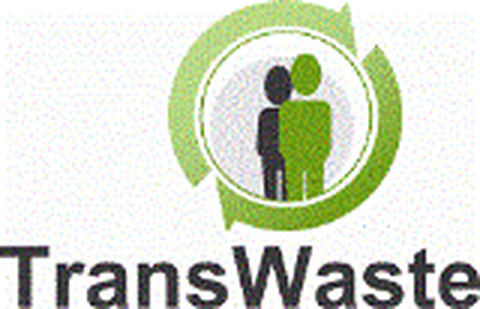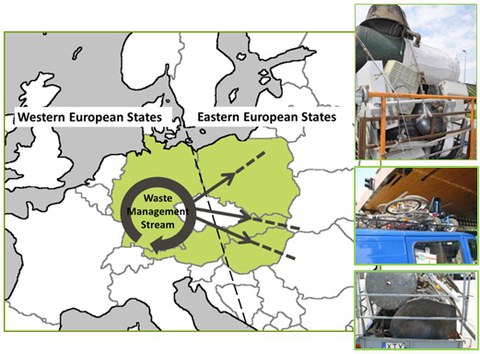TRANSWASTE research project
Formalisation of informal sector activities in collection and transboundary shipment of wastes in und to CEE
Partners:
University of Natural Resources and Life Sciences, Vienna, Austria
BAY-LOGI Institute for Logistics and Production Systems, Hungary
REPANET, Slovakia
SAT Austrian Society for Systems Engineering and Automation, Austria
WAMECO S.C., Poland
ARGE Abfallvermeidung, Ressourcenschonung und nachhaltige Entwicklung GmbH, Austria
Funding: European Commission – Interreg IVb
Duration: January 2009 - June 2012
Funded by:
Materials and reusable items are often collected by non-authorised people (informal collectors) without any statutory permits in countries with a high developed waste management and afterwards transhipped into countries having a less developed waste management (Figure 1).
Hence, informal collection and the following transboundary shipments of materials cause serious challenges in
1. Environment:
• Littering of unusable goods in unsuitable places.
• No guarantee for adequate waste processing after transportation to Eastern European regions;
2. Social background:
• Conditions of informal collectors deteriorate due to modernisation according to EU directives;
3. Economics:
• Loss of income for informal collection authorities;
• Expenses due to cleaning activities; informal collectors lose income because of reorganisation of waste management systems in CEE.
The Central Europe project TransWaste has developed options to solve these environmental and social problems by formalising the non-authorised informal collection and setting up a pilot project. Solutions have been generated by considering all stakeholder views - from informal collectors to waste associations.
Waste management companies must comply with strict and cost-intensive legal requirements, informal collectors do not. These circumstances lead to mistrust between waste authorities and informal collectors. The main challenge will be to provide a win-win situation for all parties involved by bringing the affected parties together in order to take part in a participatory process of development. Thereby formalization principles were formulated to ensure a win-win situation.
- Improvement of livelihood of informal collectors, as the living conditions of some collectors are very poor.
- No change of the basic reuse activities: their core activities, meaning the resale of still useable goods, shall remain the same.
- Environmental improvement: Adequate disposal of unsold items but also of reused items at the end of their second life have to be taken for granted
- Defining informal collector activities as a profession (business): It is necessary to define it as a profession and to name it to become recognized by all stakeholders.
- Keeping cost-neutrality for households: waste management fees need to be kept steady. No additional costs which may be due to implementation of formalization strategies shall be allocated to the households.
With the legitimisation of informal collectors in a changing system and the formalisation of the informal sector, environmental and social problems caused by informal collectors are going to be solved.
The implementation of a Transnational Action Plan concerning the handling with informal sector activities, the development of a Business Plan for an enterprise to integrate informal collectors and formalise their work as well as the integration of informal collectors into the existing formal waste collection are steps to a successful formalisation of informal sector activities.




